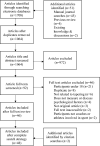The Psychology of Athletic Tapering in Sport: A Scoping Review
- PMID: 36696042
- PMCID: PMC10036416
- DOI: 10.1007/s40279-022-01798-6
The Psychology of Athletic Tapering in Sport: A Scoping Review
Erratum in
-
Correction to: The Psychology of Athletic Tapering in Sport: A Scoping Review.Sports Med. 2023 Apr;53(4):803-806. doi: 10.1007/s40279-023-01824-1. Sports Med. 2023. PMID: 36807263 Free PMC article. No abstract available.
Abstract
Taper is a common training strategy used to reduce fatigue and enhance athletic performance. However, currently, no review has summarised what psychological research has been conducted examining taper, what this research shows and what future research needs to be undertaken to extend the field. Consequently, a scoping review was conducted with three aims: (a) to determine the characteristics of psychological research examining taper, (b) to summarise psychological research collected during taper with adult athletes and coaches, and (c) to identify gaps in psychological research examining taper. Forty-eight articles were identified following an exhaustive search strategy and charted following scoping review guidelines. Results showed most research was quantitative, used a longitudinal design, was conducted in swimming, triathlon, cycling or across multiple sports, and used a university-, regional- or national-level male athlete sample. Eight themes were developed to summarise the research: Mood, Perception of Effort, Perceived Fatigue and Wellness, Recovery-Stress, Taper as a Stressor, Stress Tolerance, Psychological Preparation and Cognitive Functioning. Additionally, four research recommendations were identified: (a) conducting exploratory research that examines the impact taper has on athletes' and coaches' competition preparation and stress experience, (b) asking more advanced psychological questions and conducting multi-disciplinary research, (c) including a more diverse participant sample in studies and (d) examining the impact of psychological interventions during taper. Overall, this scoping review has highlighted the limited research examining the psychology of taper and the need for focused research that asks more complex questions across diverse populations.
© 2023. Crown.
Conflict of interest statement
The authors confirm there are no conflict of interests regarding this article.
Similar articles
-
Where science meets practice: Olympic coaches' crafting of the tapering process.J Sports Sci. 2018 May;36(10):1145-1154. doi: 10.1080/02640414.2017.1362717. Epub 2017 Aug 7. J Sports Sci. 2018. PMID: 28782993
-
Psychological skills training and a mindfulness-based intervention to enhance functional athletic performance: design of a randomized controlled trial using ambulatory assessment.BMC Psychol. 2016 Jul 26;4(1):39. doi: 10.1186/s40359-016-0147-y. BMC Psychol. 2016. PMID: 27457721 Free PMC article. Clinical Trial.
-
Examining coaches' perceptions of how their stress influences the coach-athlete relationship.J Sports Sci. 2017 Oct;35(19):1928-1939. doi: 10.1080/02640414.2016.1241422. Epub 2016 Oct 8. J Sports Sci. 2017. PMID: 27719269
-
Mental Health in Elite Coaches.Sports Health. 2024 Nov-Dec;16(6):1050-1057. doi: 10.1177/19417381231223472. Epub 2024 Jan 21. Sports Health. 2024. PMID: 38246889 Free PMC article. Review.
-
Physiological changes associated with the pre-event taper in athletes.Sports Med. 2004;34(13):891-927. doi: 10.2165/00007256-200434130-00003. Sports Med. 2004. PMID: 15487904 Review.
Cited by
-
Heart rate variability of elite female rowers in preparation for and during the national selection regattas: a pilot study on the relation to on water performance.Front Sports Act Living. 2023 Aug 24;5:1245788. doi: 10.3389/fspor.2023.1245788. eCollection 2023. Front Sports Act Living. 2023. PMID: 37691642 Free PMC article.
-
Relationship Between the Total Quality Recovery Scale and Race Performance in Competitive College Swimmers over Two Seasons.Sports (Basel). 2025 Apr 30;13(5):139. doi: 10.3390/sports13050139. Sports (Basel). 2025. PMID: 40423275 Free PMC article.
-
The Welsh Institute of Performance Science: A Decade of Integrated Knowledge Translation in Elite Sport.Sports Med. 2025 Jun;55(6):1329-1338. doi: 10.1007/s40279-025-02210-9. Epub 2025 Apr 29. Sports Med. 2025. PMID: 40299218 Free PMC article.
-
Optimizing performance and mood state in competitive swimmers through tapering strategies.Front Psychol. 2024 Jan 23;15:1307675. doi: 10.3389/fpsyg.2024.1307675. eCollection 2024. Front Psychol. 2024. PMID: 38323160 Free PMC article.
-
Efficiency in Kinesiology: Innovative Approaches in Enhancing Motor Skills for Athletic Performance 2.0.J Funct Morphol Kinesiol. 2024 Aug 14;9(3):137. doi: 10.3390/jfmk9030137. J Funct Morphol Kinesiol. 2024. PMID: 39189222 Free PMC article.
References
-
- Mujika I. Tapering and peaking for optimal performance. Champaign: Human Kinetics; 2009.
Publication types
MeSH terms
LinkOut - more resources
Full Text Sources


